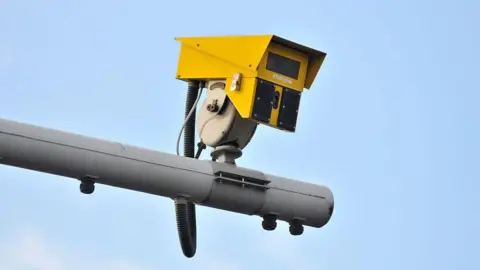'Most successful' road safety scheme in £1.8m loss
 Getty Images
Getty ImagesThe West Midlands' "most successful" road safety scheme is making a £1.8m annual loss, councillors have been told.
Members of the West Midlands Combined Authority heard crashes were cut by more than 30% on some of the roads where average speed cameras were put.
Regional road safety manager Darren Divall said the use of the cameras had led to an increase in the number of drivers being either handed fines or offered to go on a retraining course or prosecuted.
But committee member councillor Leslie Kaye said calls to keep money from fines from the scheme, instead of sending the cash to government, could lead to people seeing the cameras as a revenue generator.
Mr Divall told the transport delivery overview and scrutiny committee that keeping hold of the cash would help the scheme break even.
Kaye said he had "reservations" about requesting the proceeds of fines from government.
"The general public may with some justification start wondering whether the siting of speed cameras is for the purposes of raising revenue rather than road safety," he added.
He was also concerned that "as drivers become educated as to where the cameras are, then revenues will fall".
Mr Divall said: "The government have been written to five times so far and there are some pros in receiving and retaining the fine money.
"But this isn't about punishing drivers and we don't want the public to think it is a money-making scheme because you can see from the figures already this is making a £1.8m loss every year.
"The retention of the speeding fines is really to help break even on a scheme, which is our most successful road safety intervention."
'Frequent requests for action'
Councillor Liz Clements added: "We've got preventable deaths and serious injuries happening almost every day.
"The scheme is running in deficit and obviously represents a revenue pressure for local authorities essentially.
"That's why we need fines retention in this region. We need this to be a financially sustainable scheme for the long term.
"As local councillors, one of the most frequent requests we get from our constituencies is for more cameras and more action on speeding."
This news was gathered by the Local Democracy Reporting Service which covers councils and other public service organisations.
Follow BBC Birmingham on BBC Sounds, Facebook, X and Instagram.
